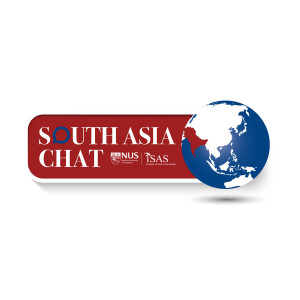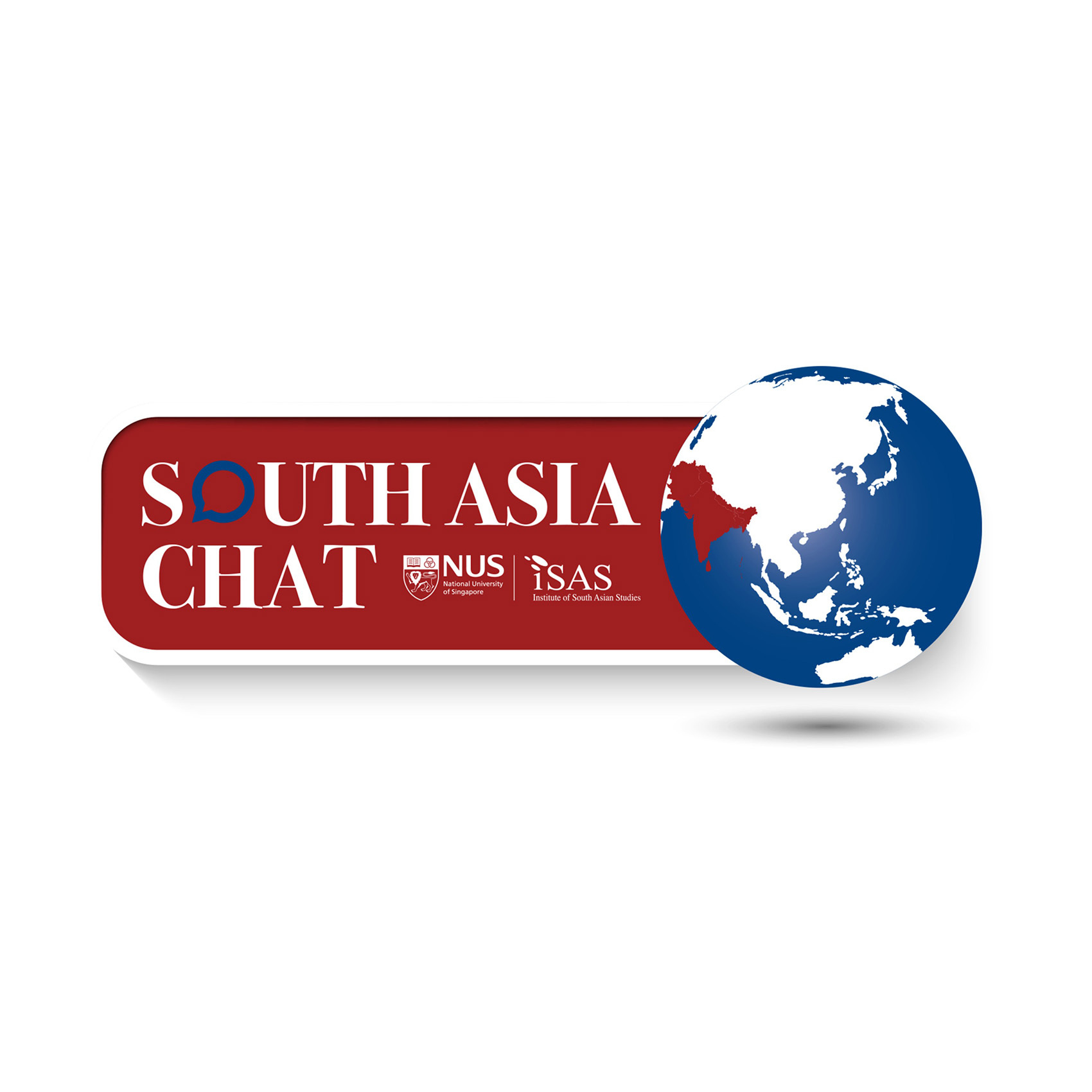Episodes

7 days ago
7 days ago
The recent Iran-Israel-US conflict affected regional dynamics, with ripple effects extending into South Asia. For India and Pakistan, both with deep but varied ties to Iran, Israel and the US respectively, the conflict posed complex diplomatic and strategic challenges. The escalation tested New Delhi's balancing act, while Pakistan hedged its relations with Iran and the US. In both cases, the conflict underscored how an external geopolitical crisis can reverberate through South Asia’s fault lines. In this episode of South Asia Chat, Ms Tanujja Dadlani, Research Analyst, ISAS, is in conversation with Dr Ivan Lidarev. He is an Asian security and international relations expert who specialises in China-India relations, and is currently a Visiting Research Fellow at ISAS, NUS.

Friday Jun 20, 2025
Episode 292: Climate Risk in Himalayas - A South Asian Wake Up Call
Friday Jun 20, 2025
Friday Jun 20, 2025
In this episode of South Asia Chat, Ms. Devyani Chaturvedi, Research Analyst at ISAS, speaks with Mr. Madhukar Upadhya, a Regional Climate Change and Climate Finance Expert affiliated with the UNDP, about the nature, evolution, and impact of natural disasters and climate change in Nepal.

Friday Jun 13, 2025
Friday Jun 13, 2025
On 30 April 2025, Government of India has announced that the 2026 nationwide census will include caste data for the first time in over a century. This decision comes amid significant political shifts following the 2024 general elections, where caste-based mobilisation played a pivotal role. In this episode, Raghaw Khattri, Research Analyst at ISAS, is in conversation with Dr Rahul Verma, Academic Visitor at ISAS. They unpack the political, social, and legal implications of the caste census, discuss its role in the opposition parties’ evolving strategy, and explore the potential impact on electoral coalitions, sub-categorisation of quotas, and the future of reservations in India.

Thursday Jun 05, 2025
Episode 290: Indus Water Treaty - Historical Origins and Contemporary Implications
Thursday Jun 05, 2025
Thursday Jun 05, 2025
In the aftermath of the terrorist attacks in Pahalgam in April 2025, the Government of India announced the immediate abeyance of the Indus Water Treaty (IWT). Signed in 1960 between India and Pakistan, the IWT was brokered by the World Bank, amidst rising post-Partition tensions and concerns regarding the sharing of water. In this episode, Muhammad Saad Ul Haque, Research Analyst, ISAS, is in conversation with David Gilmartin, Professor of History, North Carolina State University, to speak about the treaty’s colonial origins, post-Partition concerns, and the emerging dynamics putting its existence into question.

Thursday May 22, 2025
Episode 289: India-Pakistan After Pahalgam - India's Strategic Objectives
Thursday May 22, 2025
Thursday May 22, 2025
Following the Pahalgam terrorist attack, India and Pakistan witnessed the most intense conflict between the two countries since 1971. This marks a strategic recalibration in India and Pakistan's already dysfunctional relationship. In this episode, Dr Iqbal Singh Sevea, Director, ISAS-NUS, is in conversation with Ambassador Jawed Ashraf, former Ambassador of India to France, to delve into the motivations of India's military response, Operation Sindoor, the conventional and nuclear thresholds in the region, and the abeyance of the Indus Water Treaty. The conversation also delves into India's messaging and outreach to the international community following the ceasefire.

Friday May 09, 2025
Friday May 09, 2025
Following the April 2025 terror attack in Kashmir, tensions between India and Pakistan have escalated, marked by India’s suspension of the Indus Waters Treaty and the launch of Operation Sindoor. As military and diplomatic exchanges continue, questions around escalation management, international responses, and long-term regional stability have come to the forefront. In this episode, Raghaw Khattri, Research Analyst, ISAS, is in conversation with Professor C Raja Mohan, Visiting Research Professor at ISAS, to discuss recent developments in India-Pakistan relations, shifts in regional security dynamics, and the international community’s response.

Sunday Apr 27, 2025
Episode 287: The Delimitation Controversy in India
Sunday Apr 27, 2025
Sunday Apr 27, 2025
There is a controversy brewing around the delimitation of constituencies in India’s lower house of parliament or Lok Sabha which is scheduled for 2026. The southern states of India in particular are fearing a loss of seats and political power if the redrawing of electoral seats is done based solely on population figures. The number of seats in Indian parliament has been increased thrice, based on the decennial census, since the country’s independence. The last time it happened was in 1972, following the 1971 Census, when the number of seats in the Lok Sabha was fixed at 543. Dr Ronojoy Sen, Senior Research Fellow and Research Lead (Politics, Society and Governance), is in conversation with Dr Milan Vaishnav, Senior Fellow and Director of the South Asia Program at the Carnegie Endowment for International Peace, about the intricacies of the delimitation process.

Wednesday Apr 16, 2025
Episode 286: Realigning India-ASEAN Trade Ties
Wednesday Apr 16, 2025
Wednesday Apr 16, 2025
The economic relationship between India and ASEAN holds significant potential, yet is layered with complexity—especially when it comes to trade, which remains a central pillar of their engagement. With the decision to revisit the ASEAN-India Trade in Goods Agreement, concerns over trade imbalances, shifting global supply chains, and the impact of recent geopolitical tensions are taking center stage. In this episode, Saeeduddin Faridi, Research Analyst, ISAS-NUS, is in conversation with Dr Evelyn Devadason, Professor, Universiti of Malaya, to discuss what is driving trade negotiations, Malaysia's role as ASEAN Chair, and the impact of recent US trade policy disruptions.

Friday Apr 11, 2025
Episode 285: Bangladesh’s Foreign Policy - Navigating New Regional Realities
Friday Apr 11, 2025
Friday Apr 11, 2025
In the wake of recent political transitions in Bangladesh and shifting regional equations, Dhaka’s foreign policy is undergoing a subtle yet significant recalibration. From a growing openness toward Pakistan to navigating its strategic relations with India, China, and beyond, Bangladesh is stepping into a more assertive regional role while grappling with long-standing challenges like the Rohingya crisis and climate vulnerability. In this episode, Raghaw Khattri, Research Analyst at ISAS, NUS, is in conversation with Ambassador Tariq Karim, Distinguished Visiting Research Fellow at ISAS, NUS and Director of the Centre for Bay of Bengal Studies at Independent University, Bangladesh. Drawing on his extensive diplomatic career, Ambassador Karim unpacks the key drivers behind Bangladesh’s evolving foreign policy and explores how the country is positioning itself amid South Asia’s shifting geopolitical landscape.

Friday Apr 04, 2025
Episode 284: Trumps Discounted Reciprocal Tariffs - Implications for India
Friday Apr 04, 2025
Friday Apr 04, 2025
In a historic declaration of economic independence on 2 April 2025, President Donald Trump announced a fresh wave of tariffs on its trading partners and adversaries. Despite a relatively successful meeting between Prime Minister Modi and President Trump, India was unable to dodge a bullet on tariffs. President Trump declared a 27 per cent ‘discounted reciprocal tariffs’ on India. The move was seen as a response to India’s trade surplus with the United States (US), which has nearly doubled since President Trump’s first term and is projected to widen further, given India’s strong manufacturing and service sectors. The tariffs aim to address trade imbalances and promote domestic manufacturing in the US by countering what President Trump described as "unfair trade practices." This announcement comes at an important juncture, as both leaders in February 2025 agreed to work on the first phase of a bilateral trade deal in the second half of 2025. In this episode, Mriganika Singh Tanwar, Research Analyst at ISAS-NUS, is in conversation with Dr Amitendu Palit, Senior Research Fellow and Research Lead (Trade and Economics) at ISAS-NUS, to discuss the implications of reciprocal tariffs on the competitiveness of Indian exports. The discussion draws on the long-standing geoeconomic relationship between India and the US, as well as the salient reliance of the Trump administration on using tariffs as a prominent tool to shape global trade dynamics.

